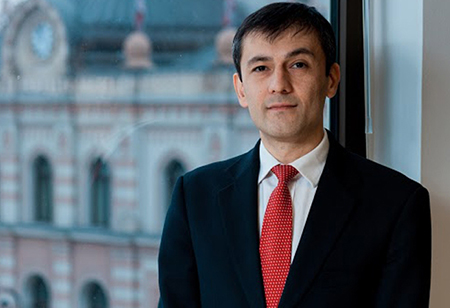IMF: “Evaluation of Georgia’s economy is needed”

The Georgian economy should be comprehensively evaluated in light of the recent economic hardship and the external factors that are affecting the economy should be adequately reviewed, says International Monetary Fund (IMF) Resident Representative in Georgia Azim Sadikov.
Furthermore, the causes and implications of the "unavoidable” depreciation of the national currency should also be investigated, and once the situation was comprehensively reviewed, action should be taken accordingly, he said.
The IMF representative voiced his opinion about how to restore order and stability in the Georgian economy, following recent regular meetings with Georgian authorities where parties discussed the current economic situation in Georgia and the "unavoidable” depreciation of the Lari (GEL).
"We have been discussing this issue together with Georgian Government representatives. Our mission started its activities yesterday. After the correct diagnosis we will continue cooperating with the Government and the National Bank of Georgia to think about appropriate reciprocate activities,” Sadikov told Rustavi 2 television channel.
"The Government runs an adequate policy for [ensuring] a floating exchange rate in Georgia, which is right. At the same time the Government should take into account the slowdown of neighbouring countries’ economies,” he added.
Sadikov explained the depreciation of the Lari, Georgia’s national currency, was a result of the global and regional environment, in which the Georgian economy had been operating.
"The Lari has been affected by two large external shocks: the sharp fall in oil prices and the crisis in Russia and its impact on the region,” Sadikov said.
Meanwhile in an interview with The Financial newspaper, Sadikov said as a fuel importer, Georgia was "benefiting directly” from lower oil prices, as this reduced the country’s import bill. However these gains were "more than offset by losses from the deepening recession and sharp currency depreciation in Russia and its ripple effect through the region.”
The IMF representative said the fortunes of many of Georgia’s key trading partners, such as Armenia, were closely tied to Russia. He said the sharp decline in oil prices since last summer had intensified the crisis in Russia and was also weighing down on other oil-dependent economies of the region such as Azerbaijan and Kazakhstan. These developments led to shortfalls in external inflows in Georgia, with exports and remittances dropping by 20-25 percent year-on-year in November and December.
"The shortfalls in foreign exchange earnings led to pressures on the Lari. Because the external shocks are large and generally seen as persistent, depreciation of the Lari was unavoidable,” he said.
"It was justified as well because resisting depreciation under the current sustained external pressures would have been counterproductive. It might have worked only for a time being and would have cost Georgia its hard-earned foreign reserves. So, it was appropriate—and we are pleased—that the authorities allowed the Lari to float in line with the market realities,” Sadikov said.
He believed there were ways other than intervention to limit the depreciation of the national currency.
"Pressure on the GEL could be reduced by sharply tightening monetary and fiscal policies. However, this can have serious ramifications for the real economy as tighter policies will likely cause severe slowdown or even a recession,” he added.
The Government of Georgia’s economic team is debating ways to bolster the country’s economy. Currently officials are exploring the idea of the World Bank, the Asian Development Bank and the European Bank for Reconstruction and Development as possible donor financial institutions who could offer loans for investing in Georgia’s infrastructural projects.
Meanwhile, Azerbaijani Manat depreciated by 35 percent.
In Georgia price of $1 at currency exchange booths is teetering between 2.30 and 2.35 GEL.
Commercial banks sell dollars at 2.31-2.36 GEL.
Today’s official exchange rate set by the National Bank is 2.1971GEL.
 Tweet
Tweet  Share
Share